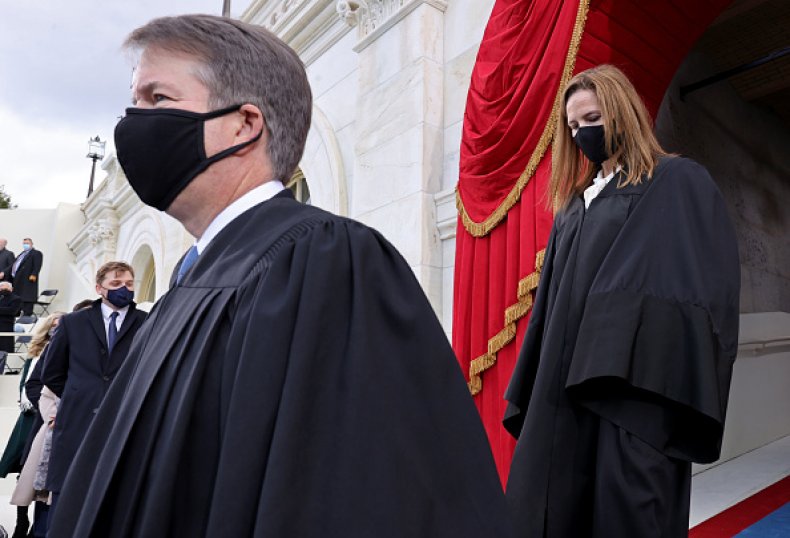Trump SCOTUS Appointees Kavanaugh, Barrett Renew Hope for Abortion Advocates
Two of former President Donald Trump's Supreme Court appointees renewed the hopes of abortion advocates on Monday after they raised questions about Texas' abortion ban.
During the morning's opening arguments, Justices Brett Kavanaugh and Amy Coney Barrett asked questions suggesting that they believe the structure of the law was designed to evade federal law and prevent abortion providers from presenting a "full constitutional defense."
The law, which went into effect September 1, has significantly curtailed abortions in Texas by allowing private citizens to enforce the near-total ban on providers and anyone else who aids or abets the procedure, even someone driving an individual to a provider.
The paired lawsuits, brought by Texas abortion clinics and the Justice Department, are the third time the Texas law has been brought before the high court. This time, the justices will address whether the structure of the law allows providers to challenge it.
Although the bench's conservative majority secured a 5-to-4 ruling in September that allowed the Texas law to go into effect, the questions raised by Kavanaugh and Barrett on Monday seemed to signal a shift for the two conservative justices.

In the oral arguments, Kavanaugh raised concerns that the law could become a model for states to restrict other constitutional rights, such as the Second Amendment's right "to keep and bear arms."
"There's a loophole that's been exploited here or used here," Kavanaugh said. "It could be free speech rights. It could be free exercise of religion rights. It could be Second Amendment rights."
He floated the possibility that a left-leaning state could allow the seller of an assault rifle to be sued by a private party.
Of the conservative justices, Kavanaugh has been the most inclined to join Chief Justice John Roberts in siding with their liberal counterparts, but Barrett's remarks suggested she might also be swayed to their side.
On Monday, she raised skepticism about whether constitutional claims on the right to abortion could ever be "fully aired" because of the structure of the law.
Barrett asked what kind of defense could be used in court by providers and anyone else who helps facilitate an abortion if sued under the law, implying that defendants would be unable to mount a full constitutional defense.
Barrett also took aim at a question from Justice Neil Grouch, the other Trump appointee, about preemptive orders that could block the enforcement of the ban, indicating that she might be inclined to vote to block the law.
It is unclear what lies ahead for the ban in Texas, seeing that the justices are not up against a deadline. But their decision to fast-track the oral arguments suggests that they may act soon and return the case to lower courts for further proceedings.
Monday's oral arguments may have raised some hope for abortion advocates, but Kavanaugh has consistently opposed abortion rights in the past, while Barrett has been praised by Republicans as the first anti-abortion female judge to be appointed to the Supreme Court.

